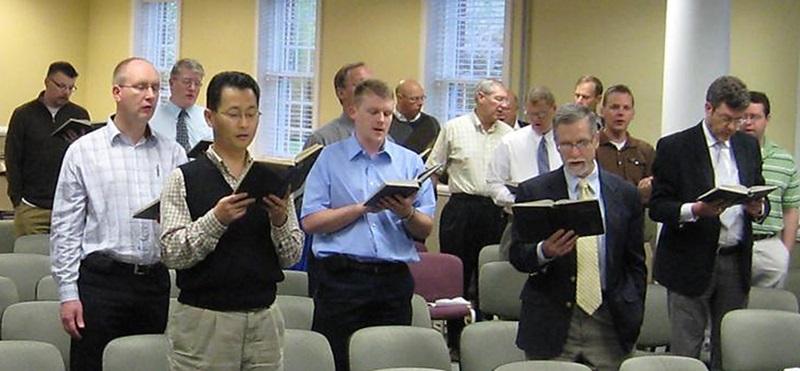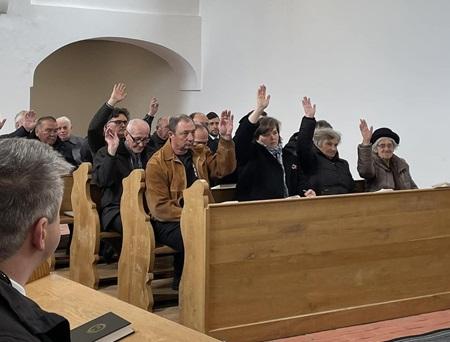Finding New Office-Bearers
Finding New Office-Bearers

The time is here again: we need to find new office-bearers to replace those whose terms has expired. A request comes from the Consistory to the congregation to submit names of brothers deemed suitable for the office of elder or deacon. A couple of weeks later the brothers office-bearers will struggle for an evening (or two!) to put together a responsible slate of nominations from which the congregation can in due time elect the required number of brothers.
Where does this system of finding office-bearers come from? Why do we follow this method in our pursuit of new office-bearers?
The Church is the possession of Jesus Christ. Consequently, how things are done in the Church – including the procedure for acquiring new office-bearers – must be determined by Jesus Christ. In this article I propose to examine the Scripture to learn how the brethren of long ago received their office-bearers.
God Calls to Office⤒🔗
Scripture makes clear that God calls people to office. In the Old Testament God, for example, determined who could serve in the office of priest. He said to Moses,
Now take Aaron your brother, and his sons with him, from among the children of Israel, that he may minister to Me as priest, Aaron and Aaron's sons…Exodus 28:1
Equally, God determined who should be the priest's assistants:
And the Lord spoke to Moses, saying: 'Bring the tribe of Levi near, and present them before Aaron the priest, that they may serve him.Numbers 3:5 f
God also called the prophets to office. Concerning Jeremiah one reads:
Then the word of the LORD came to me, saying: 'Before I formed you in the womb I knew you; Before you Were born I sanctified you; And I ordained you a prophet to the nations.' Then said I: 'Ah, Lord GOD! Behold, I cannot speak, for I am a youth.' But the LORD said to me: 'Do not say, "I am a youth", for you shall go to all to whom I send you, and whatever I command you, you shall speak.Jeremiah 1:4-5
Admittedly, Jeremiah's case was very special, but it serves well to illustrate that Jeremiah himself did not choose to become a prophet; rather, God called him to office. Moses (Exodus 3:10), Gideon (Judges 6:14), Samson (Judges 13:5), Samuel (1 Samuel 3:10), Saul (1 Samuel 10:2), David (1 Samuel 16:12 f), and Isaiah (Isaiah 6:8 f) all serve as other examples of men who were very obviously called by God to a particular office amongst God's people.
That God calls to office is drawn out forcefully in Hebrews 5:4. Concerning the office of high priest, one reads, "And no man takes this honour to himself, but he who is called by God, just as Aaron was." Verse 5 adds that for Christ it was no different.
So also Christ did not glorify Himself to become high priest, but it was [God] who said to Him: 'You are My Son, today I have begotten You’.
God also called the elders of Ephesus to their office. To them Paul said, Therefore take heed to yourselves and to all the flock, among which the Holy Spirit has made you overseers, to shepherd the church of God…Acts 20:28

Office-bearers throughout the ages, then, receive their office from the Head of the Church. That is why no man is permitted to elbow his way into the office, nor is any to push his friend into the office. Rather, "he shall wait for the time that he is called by God so that he may have sure testimony and thus be certain that his call comes from the Lord" (Belgic Confession, Article 31).
How Does God Call a Person to Office?←⤒🔗
In the Old Testament God Called Directly←↰⤒🔗
In the Old Testament God called many to office by a direct approach. God specified that Aaron had to be the high priest. The next high priest in line was the oldest son of the high priest currently in office. God Himself determined who the oldest son of Aaron was. Hence it was God Himself Who called Eliezer (Aaron's oldest son) to office. The same may be said of the kings of Judah. Of the prophets too it is evident that God called them. The quote mentioned above in relation to Jeremiah serves as an example. The Lord Jesus also very directly called the disciples to their office. The apostle Paul serves as another example of direct calling.
In the New Testament God Calls Indirectly←↰⤒🔗
In the age of the Holy Spirit's outpouring, God's approach is not as direct as it was in the Old Testament. Though it is still God who calls, He does so more indirectly, placing responsibility for this task upon the congregation, be it through the leadership of existing office-bearers. Some examples from the book of Acts demonstrate the point.
-
The Lord Jesus had appointed 12 disciples. But a vacancy existed in the group of twelve, since Judas had committed suicide. How was a replacement to be found? The procedure followed is outlined in Acts 1:15-26. One does not read that the remaining eleven unilaterally appointed Matthias to replace Judas. Rather, Peter (on behalf of the eleven) approached the congregation and sought their assistance in filling the vacancy. In verse 23 we read, "And they proposed two: Joseph called Barsabas, who was surnamed Justus, and Matthias." It is unclear who is meant in this passage by 'they', but the context suggests that it was the congregation under the leadership of Peter and the other ten disciples."And they prayed and said, 'You, O Lord, who know the hearts of all, show which of these two You have chosen to take part in this ministry and apostleship…' And they cast their lots, and the lot fell on Matthias. And he was numbered with the eleven apostles" (verses 24-26).The congregation was involved, possibly in proposing the candidates and certainly in praying. Then "they" cast lots, and the term 'they' in this instance certainly includes the involvement of the congregation. Nevertheless, it was God who called to office, for "the lot is cast into the lap, but its every decision is from the LORD" (Proverbs 16:33).
-
A second example of God calling a person to office through the involvement of the congregation can be found in Acts 6. One reads in verse 1 that the widows were being neglected even while the number of disciples was increasing. Consequently, the twelve apostles called together the whole congregation and gave this charge: "brethren, seek out from among you seven men of good reputation…" (verse 3)."And the saying pleased the whole multitude. And they chose Stephen, a man full of faith and the Holy Spirit, and Philip, Prochorus, Nicanor, Timon, Parmenas, and Nicolas, a proselyte from Antioch, whom they set before the apostles; and when they had prayed, they laid hands on them" (verses 5, 6).Though the initiative lay with the existing: office-bearers (the apostles), it is evident that the congregation played a central role in calling these brothers to their office. That God Himself with His blessing was ultimately behind their calling is evident from the "wisdom and the Spirit" by which Stephen, for example, spoke (Acts 6:10).
-
In Acts 14:23 we read of Paul and Barnabas appointing elders:"So when they had appointed elders in every church, and prayed with fasting, they commended them to the Lord in whom they had believed." The word "appointed" means literally "elect by raising hands.” Although our translation does not seem to suggest the congregation's involvement in the appointment of the elders, the reference to designating a person by raising one's hand does suggest the congregation's direct involvement.

As a result of material as the above, it is evident that the Lord calls brothers to office in a particular manner. In agreement with this manner outlined in God's Word, the churches have agreed in their Church Order to follow this procedure:
… The calling to office shall take place by the consistory with the deacons, with the cooperation of the congregation, after prayer, and in accordance, with the local regulations adopted for that purpose… (Article 3).
Prayer←⤒🔗
This article of the Church Order makes reference to prayer. The need for prayer in finding office-bearers is a practice learned from the Scriptures. The passages quoted above from Acts 1, Acts 6 and Acts 14 all make mention of prayer as a critical step in the calling procedure. This need for prayer was considered so important that Guido de Bres included the element in the 'Belgic Confession'. He wrote in Article 31:
We believe that ministers of God's Word, elders and deacons ought to be chosen to their offices by lawful election of the Church, with prayer and in good order…
This reference to prayer again gives recognition to the fact that it is ultimately God who calls to office, and the congregation (under the consistory's leadership) forms the tool by which God indicates the man of His choosing. That is why the churches have agreed (as is evident from the Church Order article quoted above) that prayer must precede the calling to office. In fact, it is good practice that in church and in our homes we multiply our prayers that the Lord show us who he wants as office-bearer and hence who He wants us to vote for.
Number of Nominations←⤒🔗
Although there was only one vacancy to be filled in Acts 1, two names were nominated: Barnabas and Matthias, in Acts 6 seven men were to be nominated for the office of deacon; seven were chosen and set before the apostles. From these two references it would seem Scripturally correct to nominate either as many brothers as there are vacancies or twice the number. In the Church Order, the churches have agreed to the following:
… The consistory with the deacons shall present to the congregation at the most twice as many candidates as there are vacancies to be filled. From this number the congregation shall choose as many office-bearers as are needed (Article 3).
The exact number of nominees, then, may vary, so that where four vacancies exist the consistory may nominate any number from a minimum of four brothers to a maximum of eight. From this number, the congregation may choose.

Local Regulations←⤒🔗
Article 3 of the Church Order, as quoted above, made reference to "local regulations.” These regulations are determined from Consistory to Consistory so that there is no confusion as to what to do with such secondary matters as blank ballots, what percentage of congregation members constitutes a quorum, what length of time a brother should serve or be free from being nominated again, what length of time ought to transpire between the date of the election and the date of the ordination, etc. These local regulations are printed from time to time for the congregation's interest in the annual Yearbook.
Conclusion←⤒🔗
It merits repeating, though, that when all is said and done, it is not the congregation who calls to office. It remains God who calls, be it through the congregation as His tool. When a person becomes an office-bearer (that is, when he gives his affirmative response to the questions put to him at his ordination), he must say in so many words that he is convinced "that God Himself, through His congregation, has called [him] to [his] office."1 This is the first question asked of a brother at his ordination. The conviction that it is God who calls is what makes the office so serious. Equally, this conviction makes the office glorious and bearable. If God calls to office, He also gives the strength to serve in that office, and this service is indeed a most beautiful task.

Add new comment